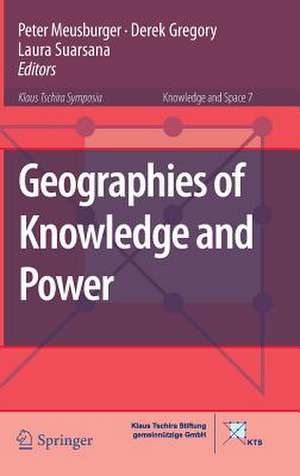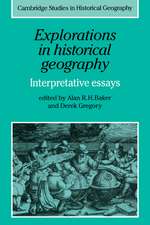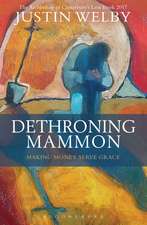Geographies of Knowledge and Power: Knowledge and Space, cartea 7
Editat de Peter Meusburger, Derek Gregory, Laura Suarsanaen Limba Engleză Hardback – 8 iul 2015
| Toate formatele și edițiile | Preț | Express |
|---|---|---|
| Paperback (1) | 565.22 lei 38-45 zile | |
| SPRINGER NETHERLANDS – 23 oct 2016 | 565.22 lei 38-45 zile | |
| Hardback (1) | 649.87 lei 6-8 săpt. | |
| SPRINGER NETHERLANDS – 8 iul 2015 | 649.87 lei 6-8 săpt. |
Din seria Knowledge and Space
-
 Preț: 401.57 lei
Preț: 401.57 lei -
 Preț: 431.94 lei
Preț: 431.94 lei -
 Preț: 281.52 lei
Preț: 281.52 lei -
 Preț: 181.58 lei
Preț: 181.58 lei -
 Preț: 293.37 lei
Preț: 293.37 lei -
 Preț: 295.38 lei
Preț: 295.38 lei -
 Preț: 402.38 lei
Preț: 402.38 lei - 18%
 Preț: 1383.49 lei
Preț: 1383.49 lei -
 Preț: 394.44 lei
Preț: 394.44 lei -
 Preț: 431.73 lei
Preț: 431.73 lei -
 Preț: 376.24 lei
Preț: 376.24 lei -
 Preț: 396.53 lei
Preț: 396.53 lei - 18%
 Preț: 1114.52 lei
Preț: 1114.52 lei - 18%
 Preț: 943.88 lei
Preț: 943.88 lei - 18%
 Preț: 949.10 lei
Preț: 949.10 lei - 18%
 Preț: 950.66 lei
Preț: 950.66 lei - 15%
 Preț: 644.95 lei
Preț: 644.95 lei -
 Preț: 429.61 lei
Preț: 429.61 lei -
 Preț: 92.91 lei
Preț: 92.91 lei
Preț: 649.87 lei
Preț vechi: 764.55 lei
-15% Nou
Puncte Express: 975
Preț estimativ în valută:
124.36€ • 132.98$ • 103.68£
124.36€ • 132.98$ • 103.68£
Carte tipărită la comandă
Livrare economică 18 aprilie-02 mai
Preluare comenzi: 021 569.72.76
Specificații
ISBN-13: 9789401799591
ISBN-10: 9401799598
Pagini: 360
Ilustrații: X, 347 p. 28 illus., 16 illus. in color.
Dimensiuni: 155 x 235 x 25 mm
Greutate: 0.68 kg
Ediția:2015
Editura: SPRINGER NETHERLANDS
Colecția Springer
Seria Knowledge and Space
Locul publicării:Dordrecht, Netherlands
ISBN-10: 9401799598
Pagini: 360
Ilustrații: X, 347 p. 28 illus., 16 illus. in color.
Dimensiuni: 155 x 235 x 25 mm
Greutate: 0.68 kg
Ediția:2015
Editura: SPRINGER NETHERLANDS
Colecția Springer
Seria Knowledge and Space
Locul publicării:Dordrecht, Netherlands
Public țintă
ResearchCuprins
Introduction: Derek Gregory, Peter Meusburger, Martina Ries.- The Geopolitics of Knowledge about World Politics: A Case Study in US Hegemony: John Agnew.- Two Men of War and Their Idea: Walter Christaller, Edward Ullman, and the Central Place Theory: Trevor Barnes.- Tau(gh)t Subjects: Sarah DeLeeuw.- Who gets the past? The Changing Face of Islamic Authority and Religious Knowledge: Dale Eickelman.- Another Order of Things: Military Imaginaries and the Middle East: Derek Gregory.- ‘A Heavenly Kingdom Shall Descend’: How Millennialism Spread from New England to the United States of America: Robert Jewett.- Elites and the Monetary Power Complex: Hans-Jürgen Krysmanski.- Telling the Future: Reflections on the Status of Divination in Ancient Near Eastern Politics: Stefan Maul.- Mutual relations between Knowledge and Power: Peter Meusburger.- Hot Spots, Dark Side Dots, Tin-pots?:The Uneven Internationalism of the Global Academic Market: Anssi Paasi.- Power/Knowledge/Geography: Speculation at the End of History: Richard Peet.- The Power of Communication: Jo Reichertz.- Enabling Knowledge: Nico Stehr.- Between Omnipotence and Powerlessness: religious Symbolizations and Theological Interpretations of Power: Klaus Tanner.- Knowledge between Language and Social Control: Ingo Warnke.- Media Control in the Twentieth Century: Jürgen Wilke.- What a book (or two) Can Do: Reflections on Man and Nature and Silent Spring: Graeme Wynn.
Textul de pe ultima copertă
Interest in relations between knowledge, power, and space has a long tradition in a range of disciplines, but it was reinvigorated in the last two decades through critical engagement with Foucault and Gramsci. This volume focuses on relations between knowledge and power. It shows why space is fundamental in any exercise of power and explains which roles various types of knowledge play in the acquisition, support, and legitimization of power. Topics include the control and manipulation of knowledge through centers of power in historical contexts, the geopolitics of knowledge about world politics, media control in twentieth century, cartography in modern war, the power of words, the changing face of Islamic authority, and the role of Millennialism in the United States. This book offers insights from disciplines such as geography, anthropology, scientific theology, Assyriology, and communication science.
Caracteristici
Offers a unique insight into the relation between knowledge and power Offers insights from various disciplines Offers spatial dimension of the relations between knowledge and power, reasons for the spatial concentration of power and knowledge












